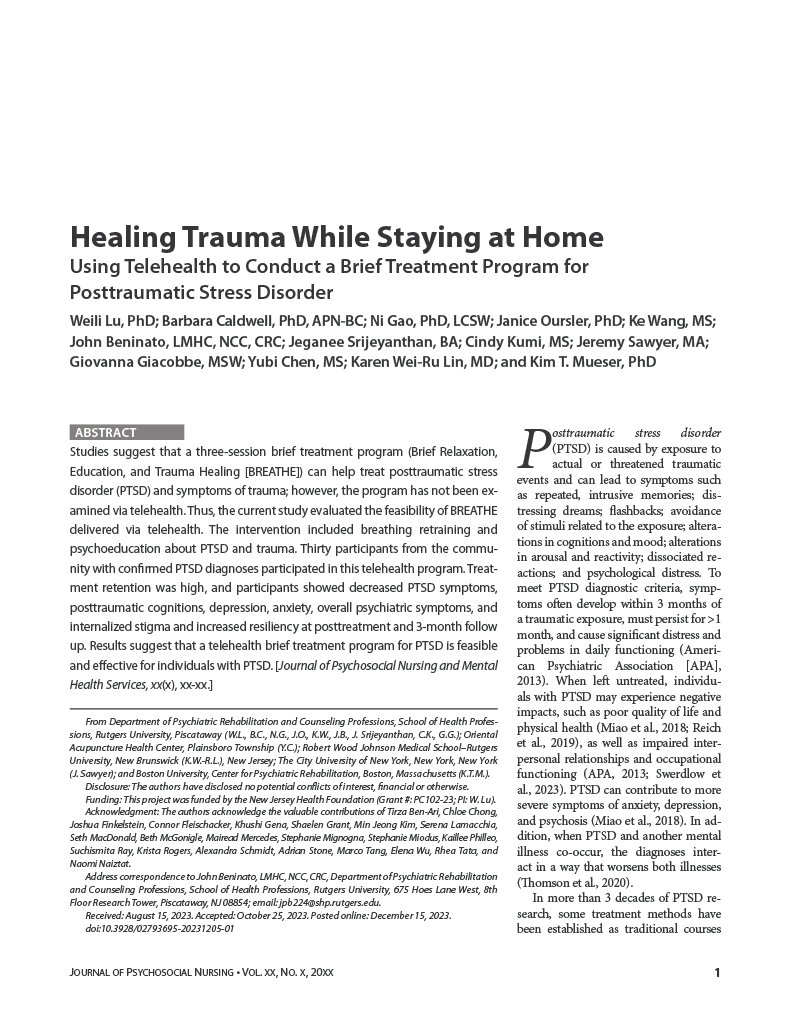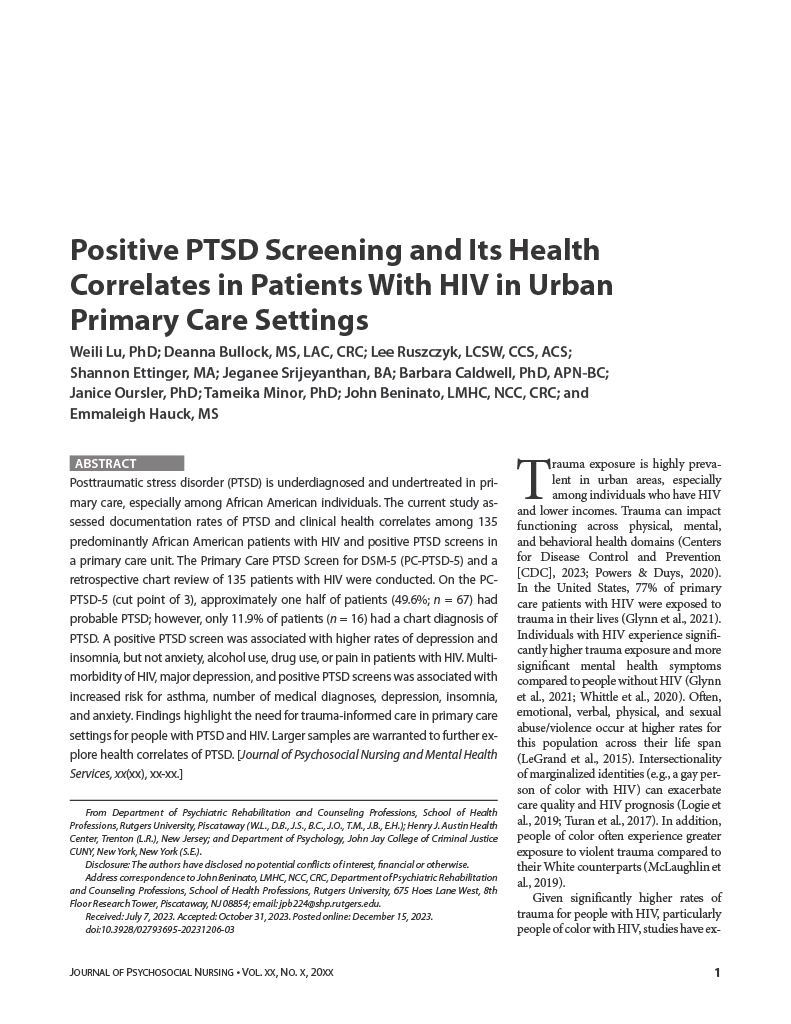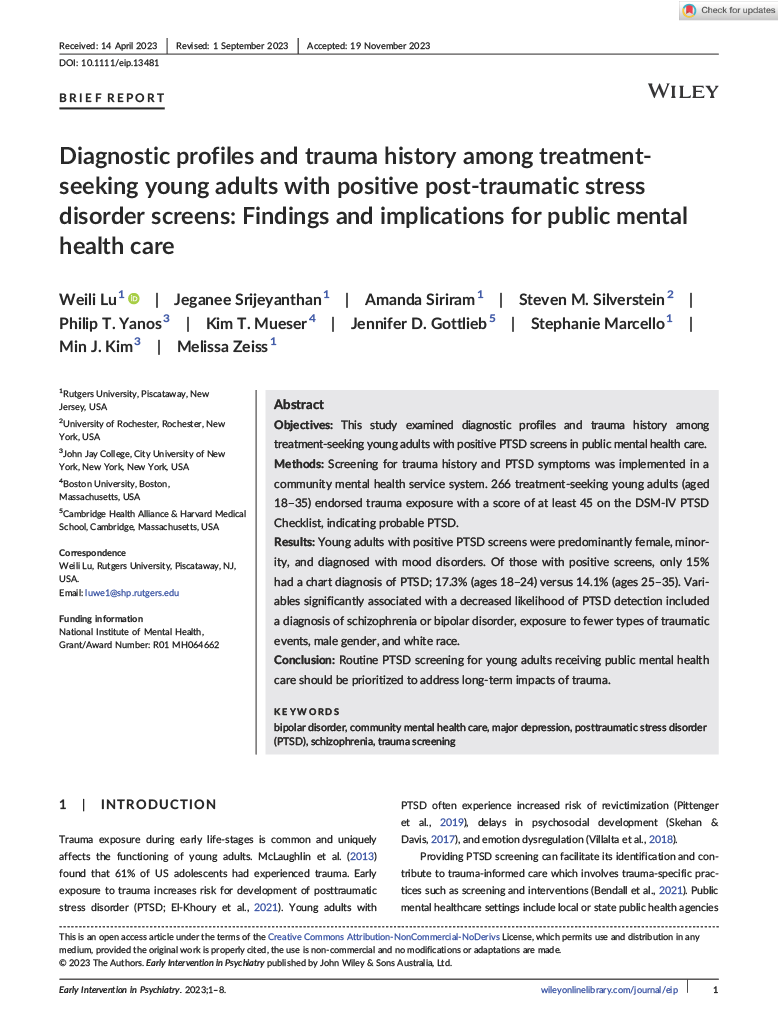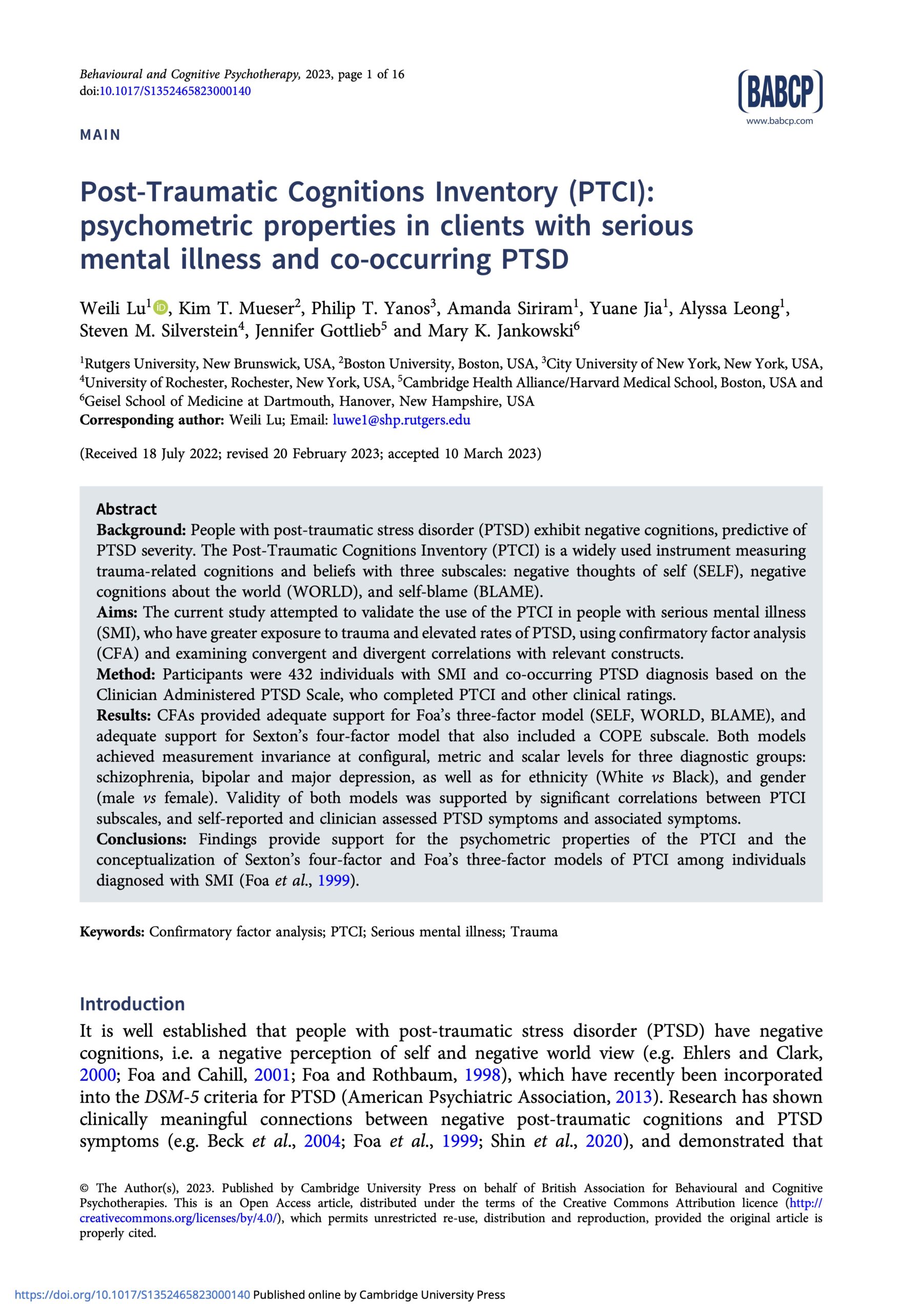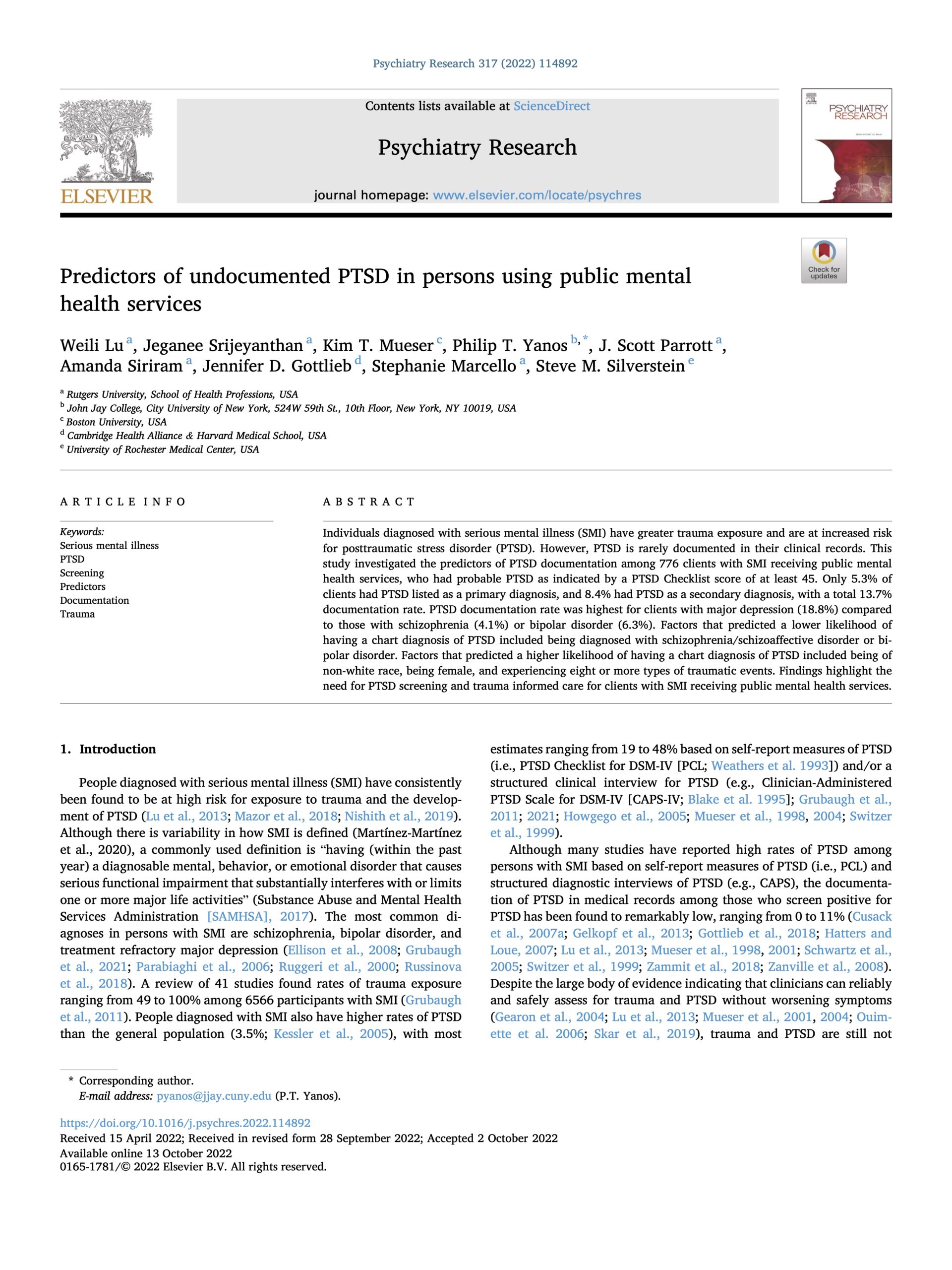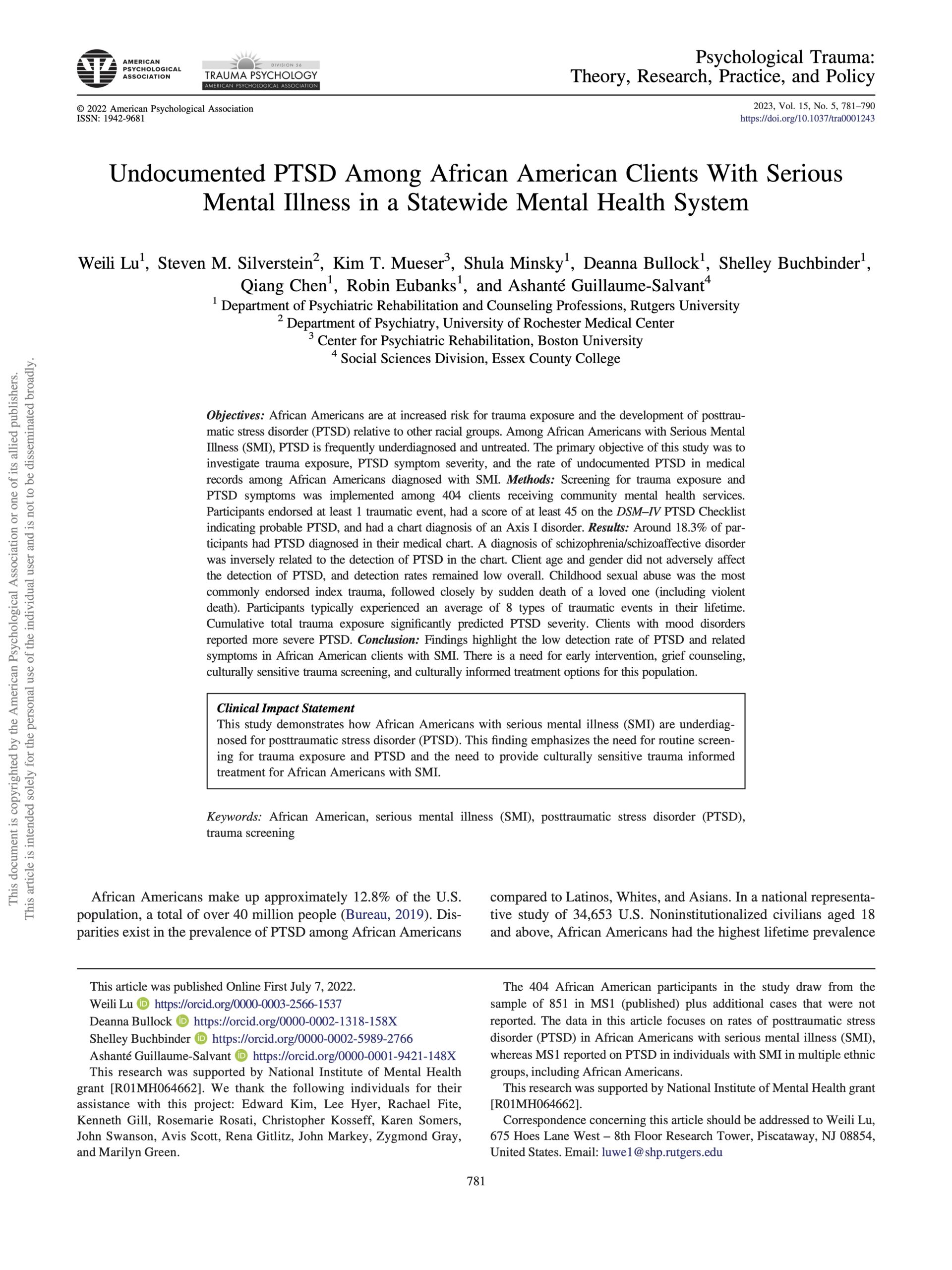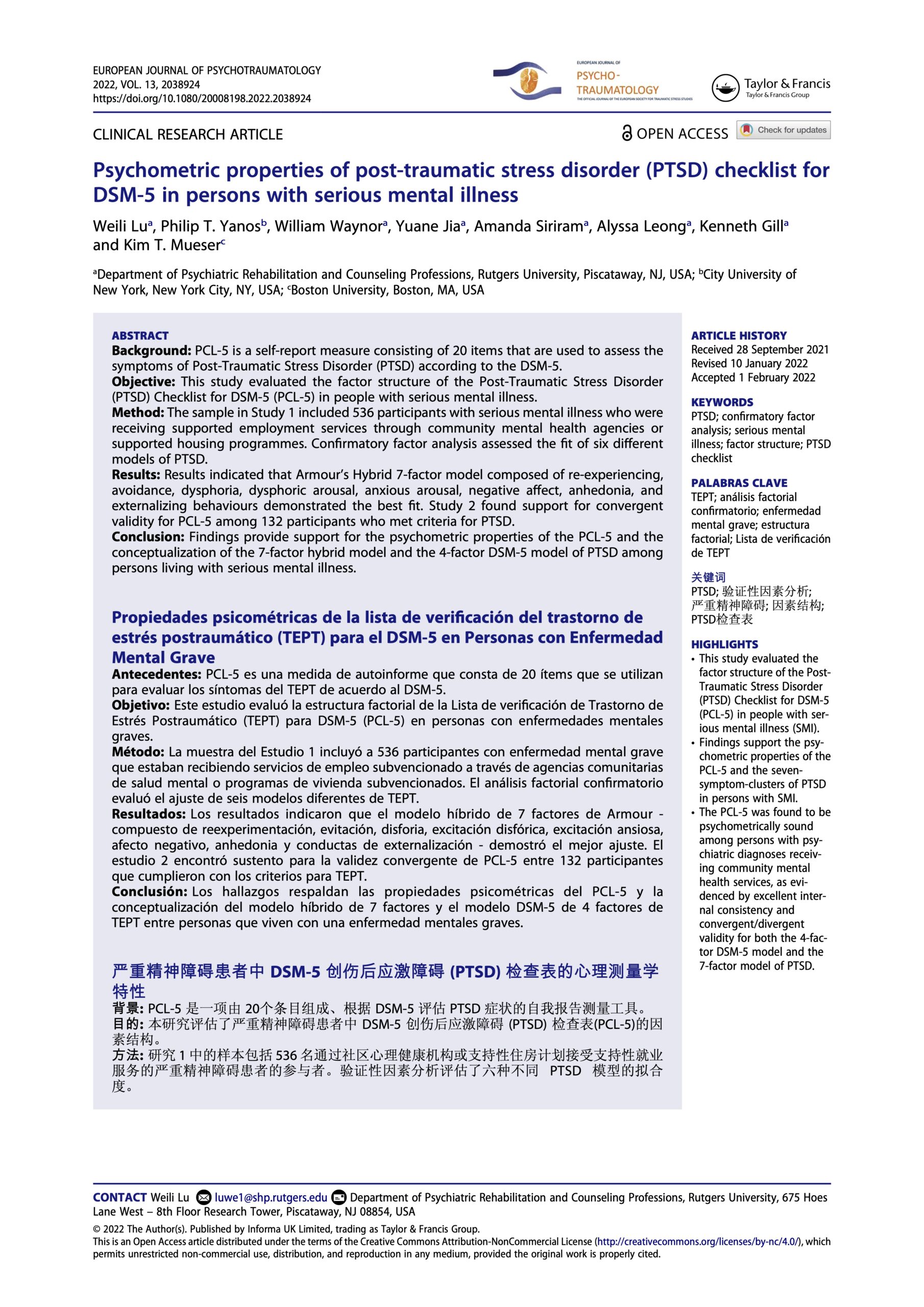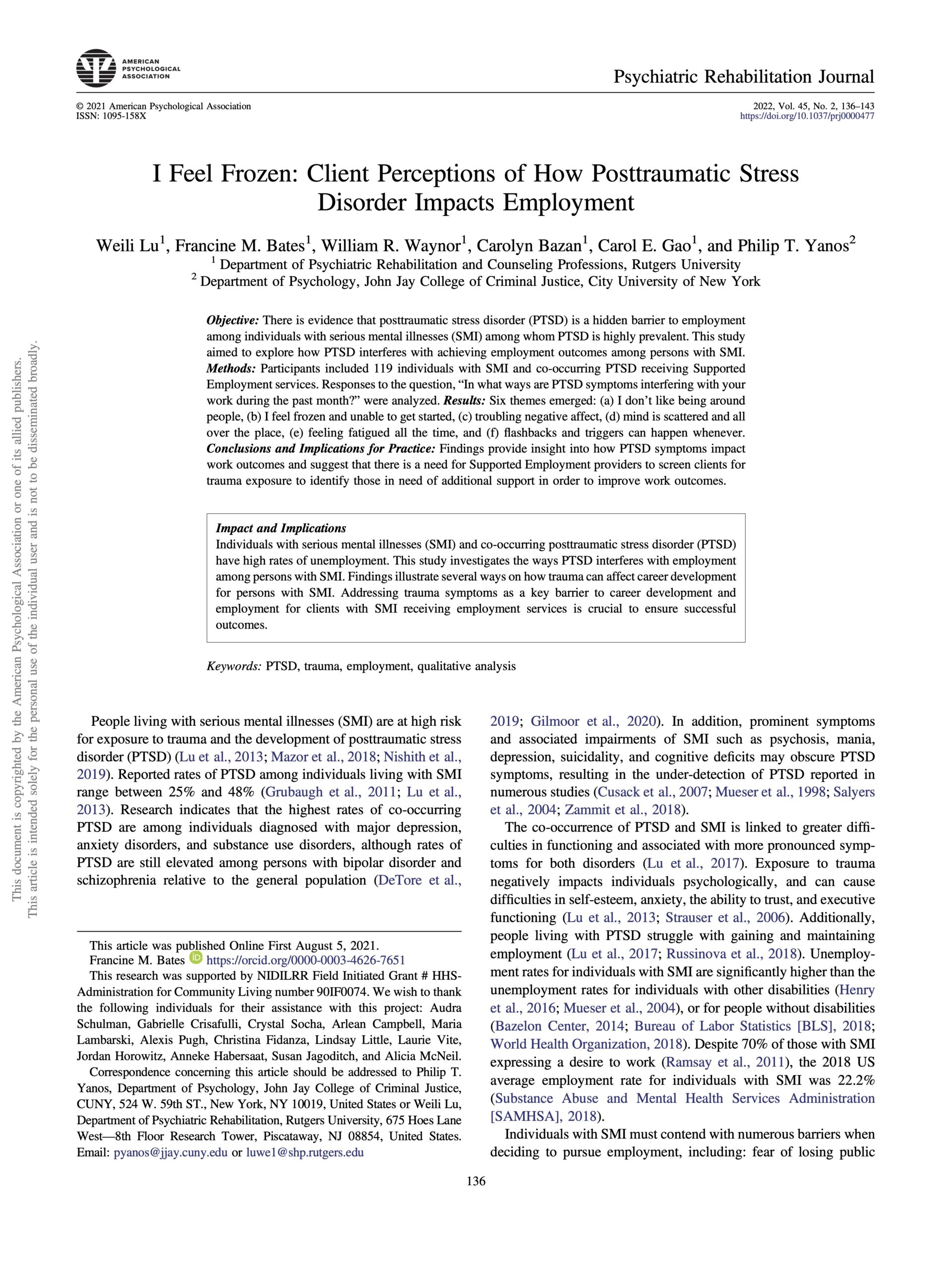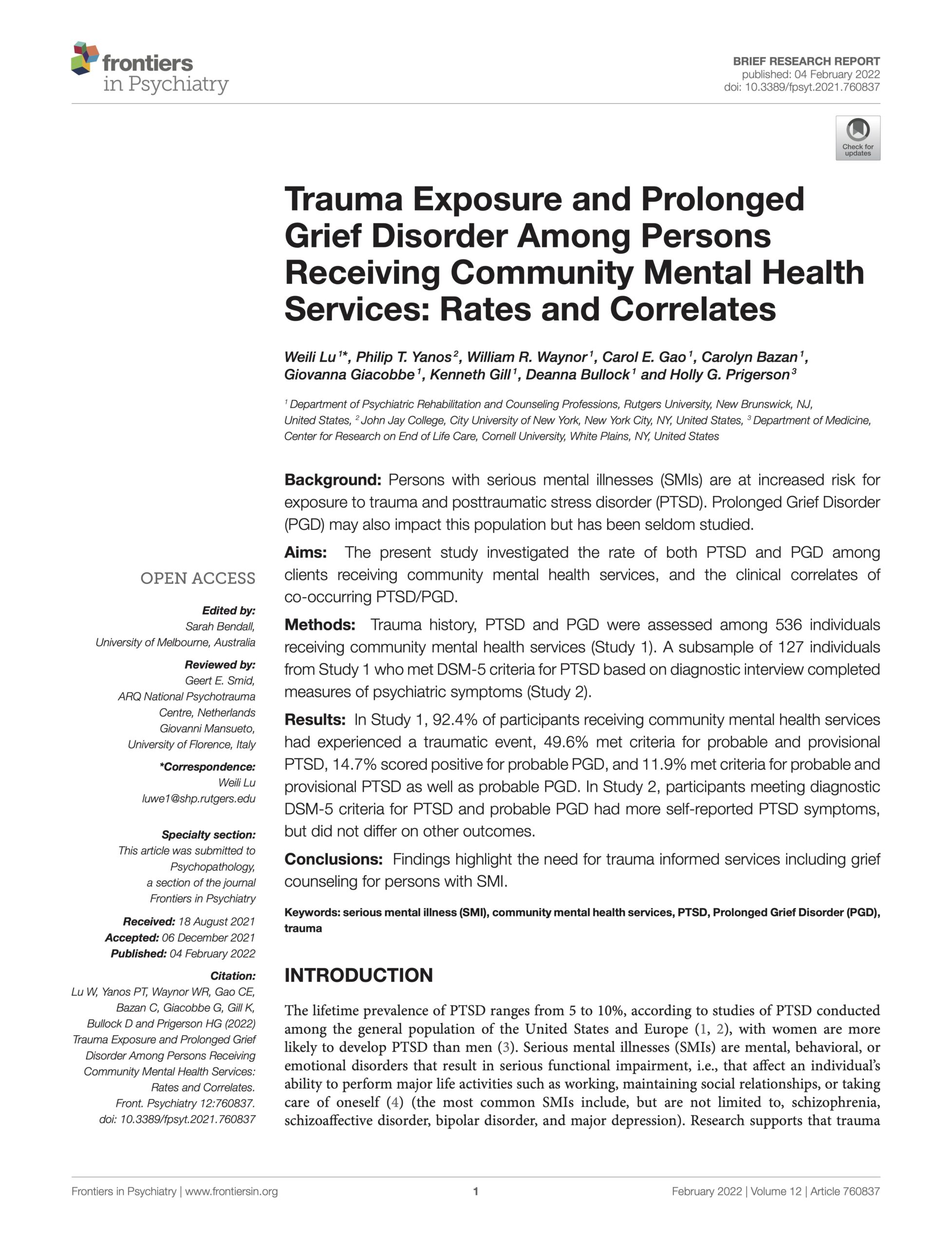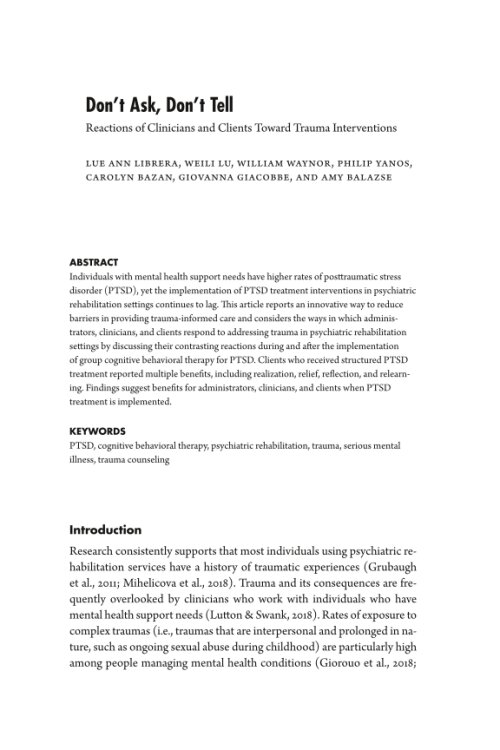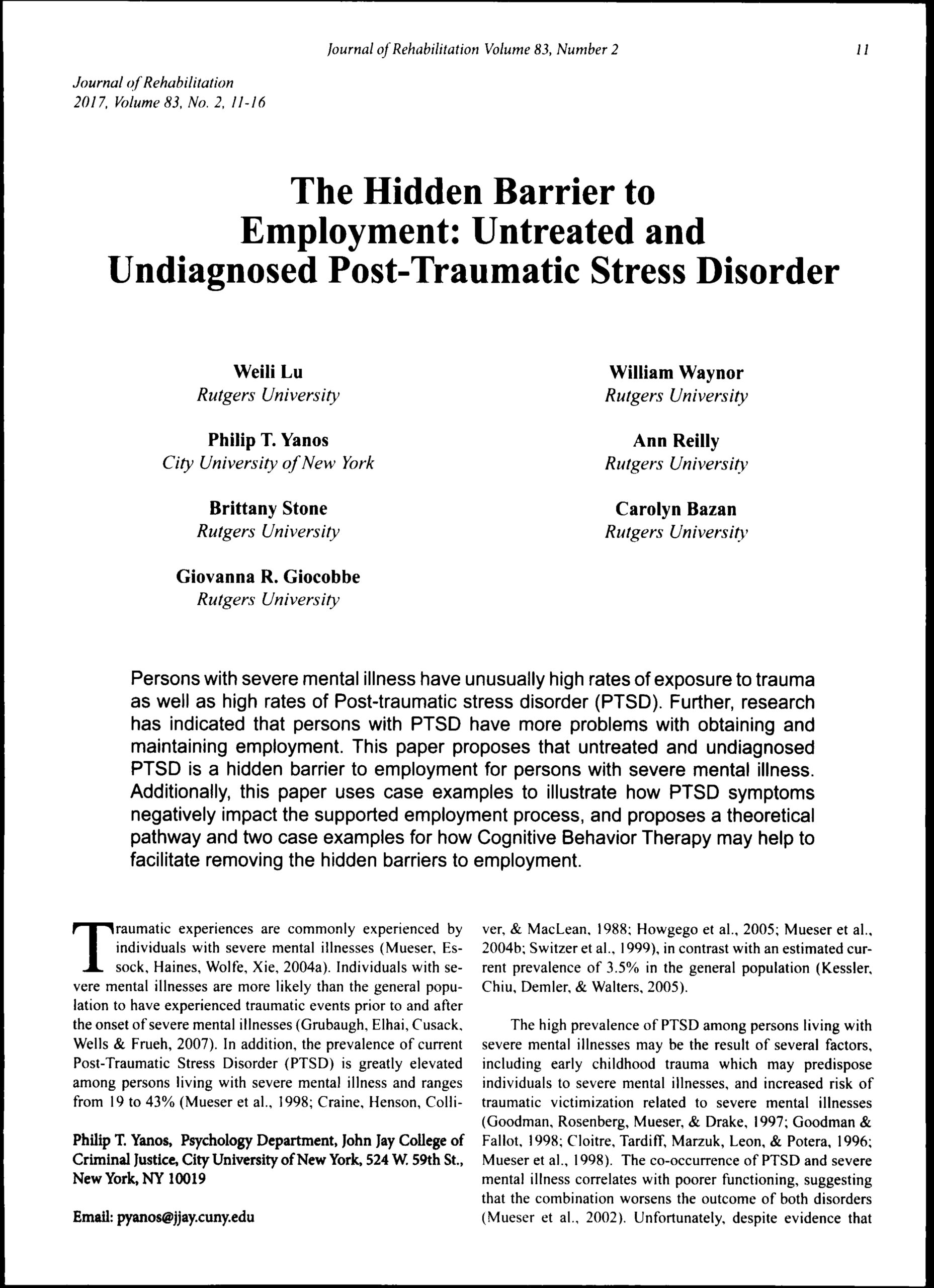Publications
2024
Trauma informed career counseling for young adults with mental health conditions
This article discusses the challenge of providing effective career counseling services for young adults with mental health conditions (MHCs) who have experienced trauma. We reviewed studies on trauma, career development, posttraumatic stress disorder (PTSD), and their impact on vocational functioning of young adults with MHCs and discussed implications of this review. Three cases are also presented to illustrate the way in which trauma and PTSD impact career counseling services. While there are evidence‐based PTSD treatment approaches for young adults with MHCs, trauma‐informed career counseling needs more research and development to facilitate vocational development among this population.
2024
Effectiveness of Acupuncture and Brief Telehealth Intervention for Individuals With Posttraumatic Stress Disorder
This open-trial pilot study evaluated the feasibility and effectiveness of acupuncture with brief therapy (ABT) for individuals with posttraumatic stress disorder (PTSD). Participants included 27 individuals with PTSD diagnoses confirmed using the Clinician-Administered PTSD Scale for DSM-5. Before ABT, 22 participants completed eight acupuncture sessions and three telehealth sessions of a brief treatment program for PTSD (Brief Relaxation, Education, and Trauma Healing [BREATHE]). ABT significantly reduced PTSD symptoms, depression symptoms, anxiety, and improved trauma-related cognition. Acupuncture can play an important role in mental health recovery, and combining acupuncture with a brief, telehealth-based treatment (BREATHE) may assist recovery among individuals with PTSD
2024
Factor structure of posttraumatic stress disorder (PTSD) in persons with serious mental illness
Trauma and posttraumatic stress disorder (PTSD) are common among individuals with serious mental illness (SMI; e.g., schizophrenia, schizoaffective disorder, bipolar disorder, treatment refractory major depressive disorder), with resultant functional impairment. Previous studies have not evaluated the factor structure of the PTSD Checklist (PCL) among persons with SMI.
This study evaluated the factor structure of the PCL in two large SMI samples from public mental health treatment sectors screened for PTSD using the PCL.
Four different models of PTSD were tested using confirmatory factor analyses.
Results indicated that the DSM-5 4-factor model (intrusion, avoidance, numbing, and hyperarousal) had the best fit. Further, the DSM-5 4-factor model demonstrated measurement invariance.
Results supported the suitability of the DSM-5 4-factor model of PTSD among people with SMI.
2024
Work is the best medicine: A qualitative analysis of posttraumatic stress disorder and supported employment
Co-occurring posttraumatic stress disorder (PTSD) negatively impacts employment outcomes for individuals with serious mental health conditions (SMHCs). This study examined how employment might help individuals manage PTSD. Sixty-eight employed individuals with SMHCs and co-occurring PTSD responded to two open-ended questions focused on how work impacted the management of PTSD symptoms and their perceived need for support from a job coach. Findings revealed themes about benefits of work on PTSD symptom management and types of provider support desired. Study implications are discussed.
2023
Healing Trauma While Staying at Home: Using Telehealth to Conduct a Brief Treatment Program for Posttraumatic Stress Disorder
Studies suggest that a three-session brief treatment program (Brief Relaxation, Education, and Trauma Healing [BREATHE]) can help treat posttraumatic stress disorder (PTSD) and symptoms of trauma; however, the program has not been examined via telehealth. Thus, the current study evaluated the feasibility of BREATHE delivered via telehealth. The intervention included breathing retraining and psychoeducation about PTSD and trauma. Thirty participants from the community with confirmed PTSD diagnoses participated in this telehealth program.
2023
Positive PTSD Screening and Its Health Correlates in Patients With HIV in Urban Primary Care Settings
The current study assessed documentation rates of PTSD and clinical health correlates among 135 predominantly African American patients with HIV and positive PTSD screens in a primary care unit. The Primary Care PTSD Screen for DSM-5 (PC-PTSD-5) and a retrospective chart review of 135 patients with HIV were conducted. On the PCPTSD-5 (cut point of 3), approximately one half of patients (49.6%; n = 67) had probable PTSD; however, only 11.9% of patients (n = 16) had a chart diagnosis of PTSD. A positive PTSD screen was associated with higher rates of depression and insomnia, but not anxiety, alcohol use, drug use, or pain in patients with HIV.
2023
Diagnostic Profiles and Trauma History Among Treatment-Seeking Young Adults with Positive PTSD Screens: Findings and Implications for Public Mental Health Care
This study aimed to examine the demographic factors, psychiatric comorbidity, and predictors of charted PTSD diagnosis among treatment-seeking young adults with positive PTSD screens in a community mental health care system. Methods: Screening for trauma history and PTSD symptoms was implemented among clients receiving community mental health services. There were 266 treatment seeking young adults (aged 18-35) endorsed at least one traumatic event and had a score of at least 45 on the DSM-IV PTSD Checklist (PCL), indicating probable PTSD.
2023
Posttraumatic Cognitions Inventory (PTCI): Psychometric Properties in Clients with Serious Mental Illness and Co-occurring PTSD
The Post-Traumatic Cognitions Inventory (PTCI) is a widely used instrument measuring trauma-related cognitions and beliefs with three subscales: negative thoughts of self (SELF), negative cognitions about the world (WORLD), and self-blame (BLAME). The current study attempted to validate the use of the PTCI in people with serious mental illness (SMI), who have greater exposure to trauma and elevated rates of PTSD, using confirmatory factor analysis (CFA) and examining convergent and divergent correlations with relevant constructs.
2022
Predictors of Undocumented PTSD in Persons Using Public Mental Health Services
Individuals diagnosed with serious mental illness (SMI) have greater trauma exposure and are at increased risk for posttraumatic stress disorder (PTSD). However, PTSD is rarely documented in their clinical records. This study investigated the predictors of PTSD documentation among 776 clients with SMI receiving public mental health services, who had probable PTSD as indicated by a PTSD Checklist score of at least 45.
2022
Undocumented PTSD Among African American Clients with Serious Mental Illness in a Statewide Mental Health System
African Americans are at increased risk for trauma exposure and the development of posttraumatic stress disorder (PTSD) relative to other racial groups. Among African Americans with Serious Mental Illness (SMI), PTSD is frequently underdiagnosed and untreated. The primary objective of this study was to investigate trauma exposure, PTSD symptom severity, and the rate of undocumented PTSD in medical records among African Americans diagnosed with SMI.
2022
Psychometric Properties of Post-Traumatic Stress Disorder (PTSD) Checklist for DSM-5 in Persons with Serious Mental Illness
This study evaluated the factor structure of the Post-Traumatic Stress Disorder (PTSD) Checklist for DSM-5 (PCL-5) in people with serious mental illness. The sample in Study 1 included 536 participants with serious mental illness who were receiving supported employment services through community mental health agencies or supported housing programmes. Confirmatory factor analysis assessed the fit of six different models of PTSD.
2022
I Feel Frozen: Client Perceptions of How Posttraumatic Stress Disorder Impacts Employment
There is evidence that posttraumatic stress disorder (PTSD) is a hidden barrier to employment among individuals with serious mental illnesses (SMI) among whom PTSD is highly prevalent. This study aimed to explore how PTSD interferes with achieving employment outcomes among persons with SMI. Participants included 119 individuals with SMI and co-occurring PTSD receiving Supported Employment services. Responses to the question, “In what ways are PTSD symptoms interfering with your work during the past month?” were analyzed.
2021
Trauma Exposure and Prolonged Grief Disorder Among Persons Receiving Community Mental Health Services: Rates and Correlates
Persons with serious mental illnesses (SMIs) are at increased risk for exposure to trauma and posttraumatic stress disorder (PTSD). Prolonged Grief Disorder (PGD) may also impact this population but has been seldom studied. The present study investigated the rate of both PTSD and PGD among clients receiving community mental health services, and the clinical correlates of co-occurring PTSD/PGD. Trauma history, PTSD and PGD were assessed among 536 individuals receiving community mental health services (Study 1). A subsample of 127 individuals from Study 1 who met DSM-5 criteria for PTSD based on diagnostic interview completed measures of psychiatric symptoms (Study 2).
2020
Don’t Ask, Don’t Tell: Reactions of Clinicians and Clients Toward Trauma Interventions
Individuals with mental health support needs have higher rates of posttraumatic stress disorder (PTSD), yet the implementation of PTSD treatment interventions in psychiatric rehabilitation settings continues to lag. This article reports an innovative way to reduce barriers in providing trauma-informed care and considers the ways in which administrators, clinicians, and clients respond to addressing trauma in psychiatric rehabilitation settings by discussing their contrasting reactions during and after the implementation of group cognitive behavioral therapy for PTSD. Clients who received structured PTSD treatment reported multiple benefits, including realization, relief, reflection, and relearning. Findings suggest benefits for administrators, clinicians, and clients when PTSD treatment is implemented.
2017
The Hidden Barrier to Employment: Untreated and Undiagnosed Post-Traumatic Stress Disorder
Persons with severe mental illness have unusually high rates of exposure to trauma as well as high rates of Post-Traumatic stress disorder (PTSD). Further, research has indicated that persons with PTSD have more problems with obtaining and maintaining employment. This paper proposes that untreated and undiagnosed PTSD is a hidden barrier to employment for persons with severe mental illness. Additionally, this paper uses case examples to illustrate how PTSD symptoms negatively impact the supported employment process, and proposes a theoretical pathway and two case examples for how Cognitive Behavior Therapy may help to facilitate removing the hidden barriers to employment.




